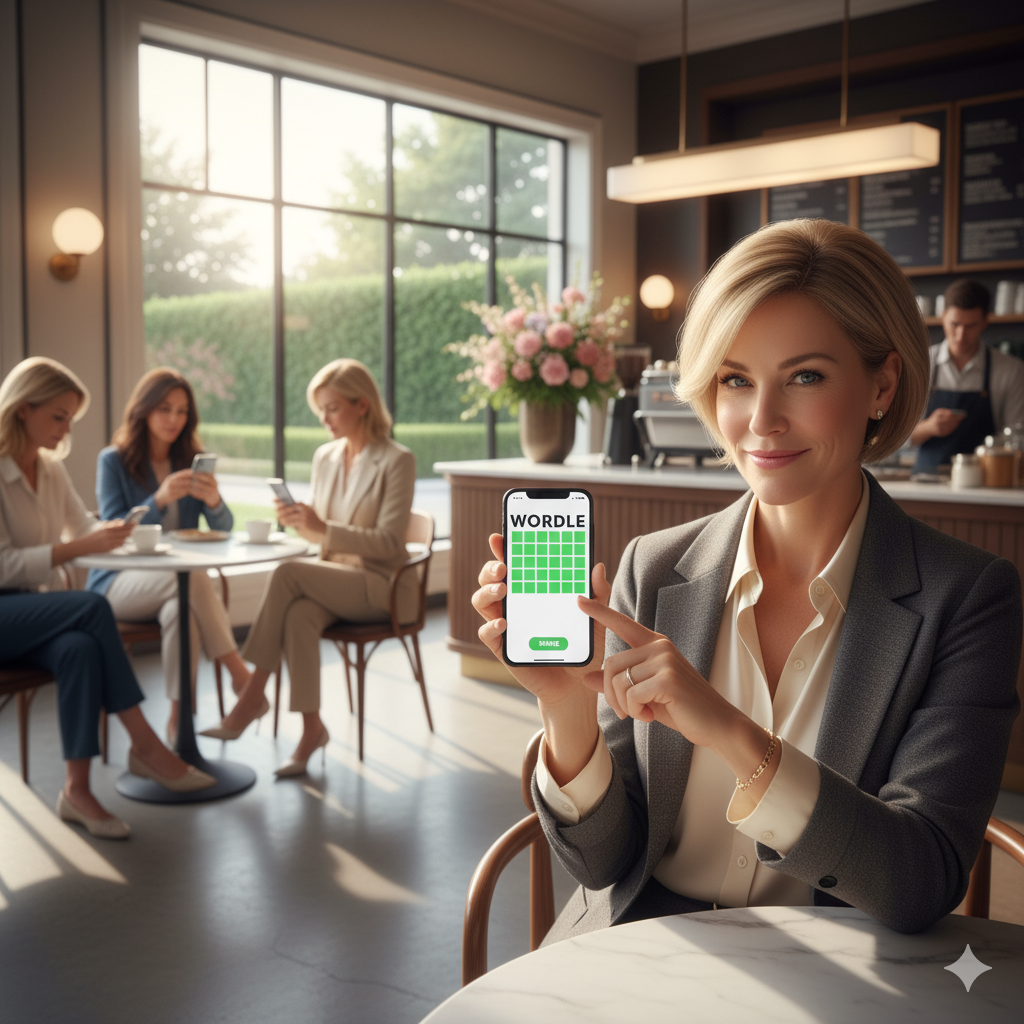What’s the deal with grown billionaires huddled over their phones at 6 AM, frantically typing five-letter words? It’s not texting their lawyers—it’s Wordle. And somehow, your morning coffee order now depends on whether you got it in three tries.
The Great Morning Migration
Picture this: You walk into Jack’s Coffee on Newtown Lane at 7 AM. The usual suspects are there. The hedge fund king checking futures while ordering his oat milk cortado. The most common time to play Wordle in the US is 9am, but apparently nobody told East Hampton. Here, status means being first.
Everyone’s staring at identical gray squares on their phones. But here’s where it gets weird: they’re not scrolling Instagram or checking their Tesla stock. They’re playing New York Times Wordle. And suddenly, whether you solved it in two tries or six has become the new Rolex.
The Unspoken Hierarchy
There’s an entire social structure built around those little colored squares. Games have fostered a broader sense of community, reinforcing their status as sources of mental stimulation and symbols of modern intellectualism. Translation: You’re not just guessing words anymore. You’re demonstrating your superior intellect to the Martha Stewart wannabe at table six.
The two-guess solvers? They’re the new aristocracy. They casually mention their victory while ordering their single-origin Ethiopian pour-over. Meanwhile, the six-guess peasants quietly sip their lattes in shame. The five-guess middle class pretends they meant to take that long because “strategy is everything.”
Digital Status vs. Designer Handbags
Remember when showing wealth meant carrying a Birkin bag to brunch? Social life in the Hamptons has always been about subtle signals. But pandemics change everything. Now the ultimate flex isn’t what’s hanging on your arm—it’s how quickly your brain processes five-letter combinations.
This shift represents what researchers call “discreet status symbols.” You can’t buy your way into New York Times Wordle success. No amount of money makes “JAZZY” easier to guess. It’s pure intellectual capital, which makes it irresistible to people who already have everything else.
The Psychology of Public Victory
Here’s what’s brilliant about this whole phenomenon. The game creates 30 identical squares that tell your entire story. Green squares mean you’re a genius. Yellow squares suggest you’re close but not quite there. Gray squares? Well, gray squares don’t lie.
When someone shares their Wordle grid on social media, they’re essentially posting their IQ test results. But it’s socially acceptable because “it’s just a game.” Right. And the Kentucky Derby is just horses running in a circle.
Morning Coffee Theater
The performance aspect is everything. Watch someone solve New York Times Wordle in a crowded coffee shop, and you’ll witness a masterclass in controlled celebration. The slight smile when they nail the second guess. The way they casually turn their phone so adjacent tables can glimpse their victory.
Or observe the agony of defeat. The furrowed brow on guess five. The desperate letter rearrangement on guess six. The shame spiral when they fail completely and must wait until tomorrow for redemption. It’s like watching someone’s net worth fluctuate in real time, except it’s their self-worth.
The Great Democratizer
What makes this status symbol particularly insidious is its apparent equality. Everyone gets the same word. Everyone gets six chances. After the New York Times acquired Wordle from its creator in January 2022, its player base grew to tens of millions. But in East Hampton coffee shops, millions of players mean nothing. Only your guess count matters.
The billionaire’s wife and the barista are suddenly on equal footing. Money can’t influence the algorithm. Connections won’t change today’s answer. Your summer house in the Hamptons means nothing if you can’t figure out “CRANE.” It’s pure intellectual meritocracy disguised as morning entertainment.
The Competitive Undercurrent
Nobody admits they’re competing, but everyone’s keeping score. Friend groups develop elaborate strategies for sharing results. Some send screenshots immediately after solving. Others wait until everyone’s finished to avoid giving hints. The really devious ones share fake results to throw off the competition.
There are unofficial leaderboards tracked via group chats. Running tallies of average guess counts. Heated debates about starting word strategies. The luxury lifestyle scene always finds ways to turn leisure into competition, and New York Times Wordle provides the perfect vehicle.
The Cultural Moment
This isn’t just about word games. It’s about how we signal intelligence and sophistication when traditional markers have lost their meaning. When everyone’s wearing designer clothes and driving luxury cars, how do you stand out? You solve puzzles faster than your neighbors.
The phenomenon reveals our deep need for intellectual validation. In a world where information is instantly available, the ability to solve problems quickly has become the new currency of respect. New York Times Wordle offers daily opportunities to prove your mental agility to an audience that matters.
The Morning Ritual Revolution
What started as a simple word game has evolved into a sophisticated social ritual. Coffee shops have become inadvertent testing centers for cognitive performance. The morning rush isn’t just about caffeine anymore—it’s about mental preparation for the day’s intellectual challenge.
Baristas report customers ordering drinks while simultaneously solving their daily puzzle. The successful ones tip better. The defeated ones need extra shots of espresso. Some establishments have started posting hints on their chalkboard menus. Others ban phone use during peak hours to avoid the pressure.
In the end, New York Times Wordle has achieved something remarkable: it’s made word puzzles into social currency. And in East Hampton coffee shops, where everything is about image and status, that five-letter victory has become the ultimate morning flex. Who knew intellectual superiority could taste so good with a perfectly crafted latte?
Ready to Elevate Your Status?
🎯 Advertise with Social Life Magazine – Position your luxury brand among East Hampton’s elite decision-makers. Submit your advertising inquiry here.
📧 Join Our Exclusive Community – Get first access to luxury events and insider Hamptons intel. Subscribe to our email invites here.
📖 Print Magazine Subscription – Nothing says sophistication like Social Life Magazine on your coffee table. Subscribe to our print edition.
🏇 Polo Hamptons 2026 – The ultimate status event returns. Secure your tickets, cabanas, and corporate sponsorships. Reserve your spot at Polo Hamptons.


